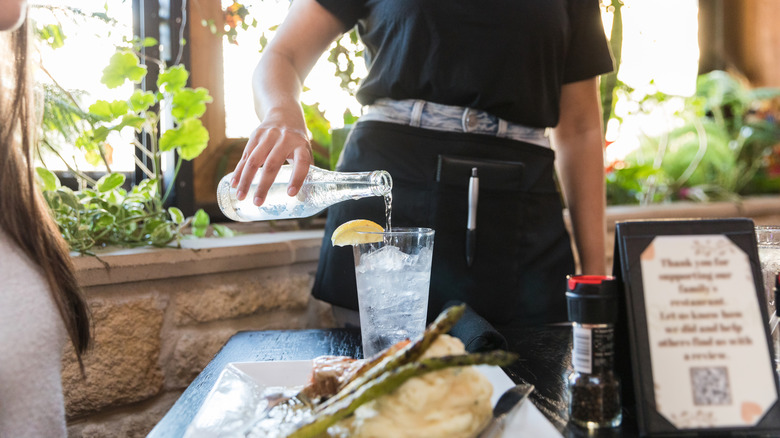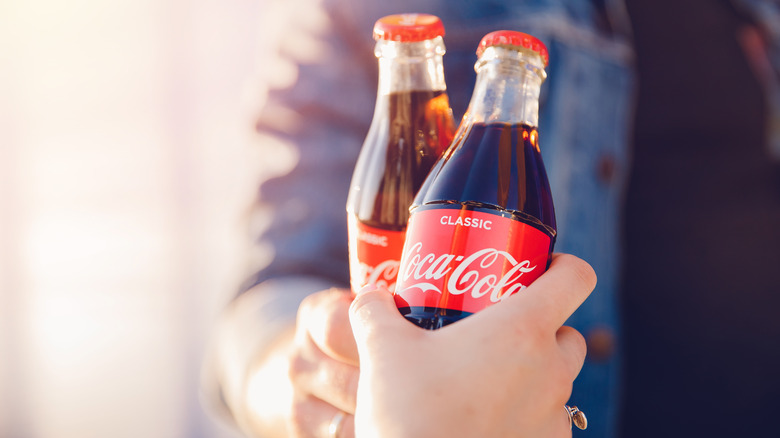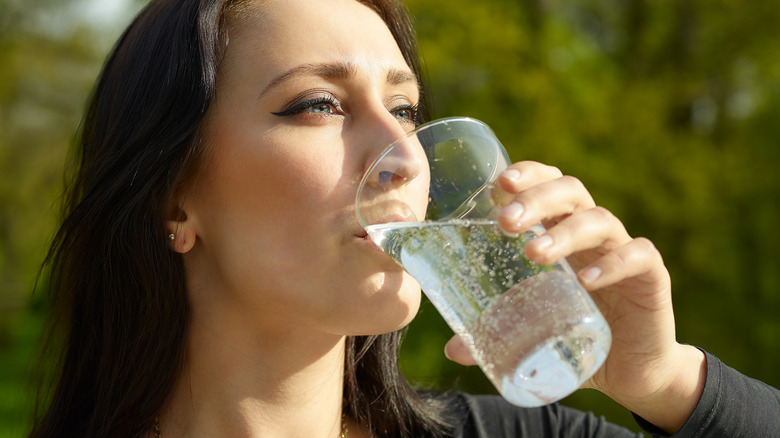Why Carbonated Beverages Tickle Your Nose When You Swallow
You can't start your day without your favorite soda. Cracking it open and feeling that slight tickle as it slides down your throat is something that you've come to enjoy. But as you look at the can in your hand, you wonder why carbonated beverages tickle your nose when you take a drink. Is it the carbonation bubbling up your nose?
Carbonated beverages have carbon dioxide added to them to make that refreshing fizz. You can buy carbonated drinks in soft drinks, water, and energy drinks. You might even make them at home with the right tools. In addition to the carbonation, they typically have a bit of sweetener and artificial flavors thrown in to give you a bit of sweetness with that sparkle. And that tickle that you feel is your body's response to the carbon dioxide activating the receptors in your nose.
Take a few minutes out of your day to get the science behind why carbonated beverages set off your spice sensors. After all, it's an enjoyable burn that many people love.
Carbonation is the spice of life
Cracking open your first carbonated drink in the morning literally makes your mouth water in anticipation. Whether grabbing a bottle of sparkling water or your favorite caffeinated soda, that first drink might have you choking just a bit. In fact, from years of experience, you might even take that first drink a little slower than the rest. The reason your throat and nose get that tickling sensation is the spicy taste response set off by the carbon dioxide, according to a study in The Journal of Neuroscience.
While you might not think of your Sprite as spicy, the sensors within the nasal cavity do. Study author Emily Liman told the University of Southern California (USC) News, "Carbonation evokes two distinct sensations. It makes things sour, and it also makes them burn. We have all felt that noxious tingling sensation when soda goes down your throat too fast." The feeling in the nasal cavity is like the sensation you get when you consume mustard or horseradish. This is because the study noted that "CO2 specifically activates a subpopulation of trigeminal neurons that express TRPA1, a mustard oil- and cinnamaldehyde-sensitive channel."
So that feeling you get when carbonation tickles your nose is a pain response to spice. It's also an innate human response that lets you sense the carbon dioxide in rotten food.
Why people like carbonated drinks
Carbonated beverages are big business. Statista showed that 7.56 billion cases of carbonated soft drinks were bought in 2021.
The why behind why humans crave that fizz isn't as well understood, but there are several theories. One theory is that carbonation might make beverages taste colder. Research in Chemical Study found that adding different concentrations of CO2 worked to make the taste receptors perceive the drink as colder. CNN said that the fizz factor combined with the sugar might be to blame for human's love of carbonated drinks. The sugar in carbonated soft drinks triggers your reward system, giving you a rush. Registered dietician Cordialis Msora-Kasago stated on CNN, "The more soda you drink, the bigger the 'reward,' and as would happen with most pleasurable things, we develop an affinity and want even more of them." You can even get addicted to soda.
Popular Science also stated that humans' love of carbonated beverages doesn't make sense, given that our bodies are designed to sense carbon dioxide and find it disgusting. However, it could be that the human spirit likes living on the edge. So, people enjoy the feeling of a slight bite of carbon dioxide against their tongue and throat. But is it good to have that added carbonation in your life?
Is carbonation bad for you?
Carbonation itself is not bad for you. However, the Centers for Disease Control and Prevention (CDC) noted that having too much sugar in your diet is bad for your health. Unfortunately, many soft drinks are full of sweeteners that, when consumed in excess, can lead to obesity, diabetes, tooth decay, and heart disease. So it's crucial to consume carbonated soft drinks in moderation and watch your sugar intake. Medical News Today noted that diet sodas can be unhealthy due to their artificial sweeteners. In addition to leading to several health issues, overconsumption of low-calorie carbonated beverages harms tooth enamel, according to a study in The Journal of Clinical Pediatric Dentistry.
If you like the sparkle but want to keep it healthy, sparkling water has some significant benefits and is recommended by the CDC. Make sure to steer clear of those filled with artificial sweeteners, according to Healthline. Look for natural sparkling water that comes from a spring with natural minerals. Remember that even carbonated water is acidic and can make your kidneys work harder to flush toxins out of the body.
There is a good reason that carbonation gives you a tickle in your throat and nose when you drink it because your body thinks it's a bit spicy. And if you've ever guzzled a carbonated drink too fast, you know that painful burn as it slides down your throat. Despite its painful tickle, soft drinks are a beverage that many individuals enjoy.




